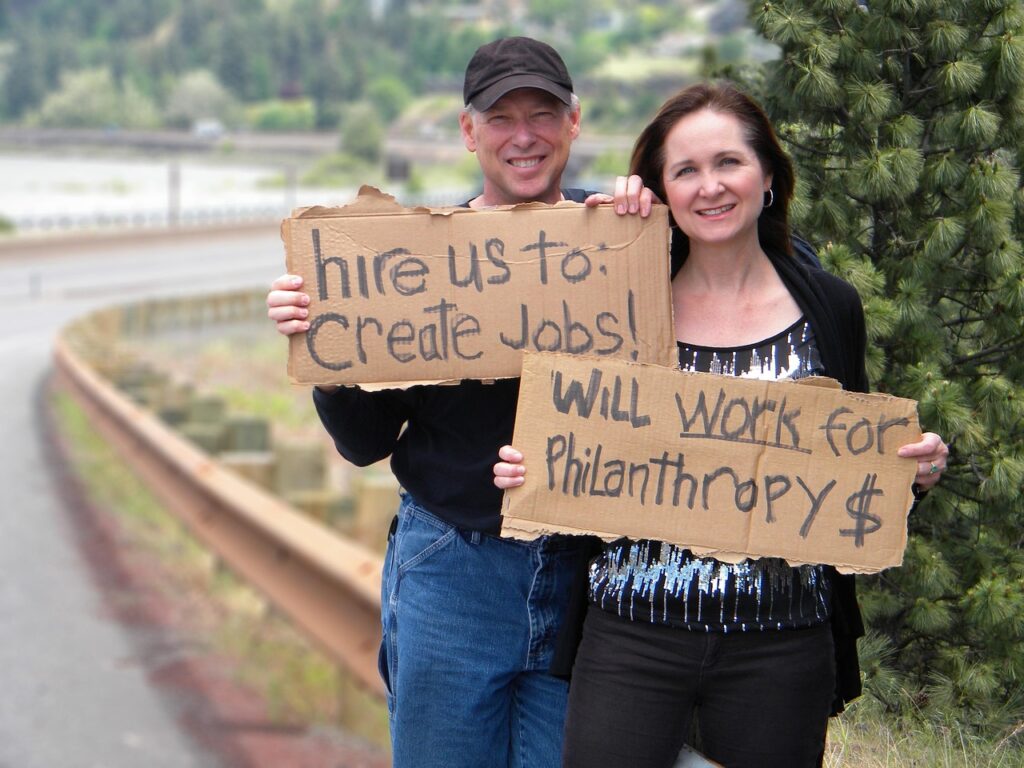Unemployment can rattle your sense of routine and self-esteem. Our jobs oftentimes provide us with “structure, purpose, and meaning,” so it is no wonder this can be stressful when we lose one. It is reasonable to feel anxious, frustrated, and to some degree, even ashamed. Accept these are normal and temporary feelings, and to avoid jumping to self-criticism: remind yourself that your worth is not tied to a job. In the immediate situation, beginning with acceptance of your emotions (you can use a journal or speak with a friend) so that you can let go of the anger and grief. Career experts agree that the next step is to accept what happened, then switching gears and take deliberate action. For example, one counselor suggests using this time as an opportunity to pause, consider what you really want, and plan your next step. Keep in mind, plenty of people experience bump in their career but grow strong by taking charge in a deliberate way of their next step. Here are some useful guidelines to beat with idleness

1: Build a daily routine
Creating a daily structure helps restore a sense of normalcy and purpose. You are in a job search, think of it as a 9–5 job—wake up at the same time every day, get dressed, and start every day with set goals. Maybe you are searching for jobs and applying in the morning, and learning new skills or volunteering in the afternoon, and exercise or hobbies in the evening. A schedule like this can “add some normalcy and purpose” The point of creating a schedule and sticking to it is so you can keep busy even if you are on a break and combating the paralysis that can accompany inactivity. Select reasonable daily goals: Make a daily list of things to be done each day (for example, apply to 2–3 jobs, complete study for a chapter in a new course, contact a friend) so that you feel a sense of accomplishment. Treat job searching like a job: Designate a “start” time and an “end” time for job applications. Research shows that treating the search as a schedule makes you more efficient. Moreover, make sure you take breaks, – Plan to take short breaks and have time for fun (a walk, a favorite hobby, family time) to recharge. Do not let your job search hijack every hour of your day. Hence, break big tasks into steps: If your goal feels daunting break it down into small achievable steps (e.g. research one field, take one class) and you can avoid the stress. Nonetheless, having an active routine will turn unproductive hours into a structured activity. For example, over the first few weeks Emily developed a schedule whereby she applied for jobs from 9–11 AM, completed an online coding course from 1–3PM, and walked her dog in the evenings. Each week the routine helped Emily feel more in control and increased her successes and confidence.

2: Focus on Self-Care and Health
When you suddenly have a lot of free time on your hands, it is easy to abandon having healthy habits. In fact, stress through job loss can make self-care more imperative than ever. Strive for balance in your life: get enough sleep (7 to 8 hours a night), eat healthy food, and exercise regularly. Physical activity – even a daily stroll or home workout – is a proven stress-reducer and mood enhancer. It also make time for fun and downtime: “Your job search will be much more effective when you are mentally, emotionally, and physically at your best. Using relaxation techniques including deep breathing, meditation or yoga helps to reduce anxiety. Applying and practicing self-care strategies such as exercise intended for at least 30 minutes of moderate exercise on most day such as (walking, jogging and Yoga is helpful .
Practical self-care steps include:
- Exercise releases endorphins & reduces the anxiety that comes with uncertainty.
- Sleep hygiene – going to bed and wake up at the same times regularly. Good sleep allows you to be you are most energized and focused for those productive days.
- Nutrition: Try to eat regular healthy meals to support your mood and energy. Caffeine and junk food can feed stress.
- Mindfulness: Take 5-10 minutes daily to practice breathing exercises or mindfulness-based meditations. Apps or simple guided meditations help with clearing the mind.
As an example, Raj discovered that taking online exercise classes for 30 minutes each morning was helpful. He also took a few minutes every morning to write down three things that he was grateful. This helped him maintain a positive perspective. Simple routines like this promote a sense of balance, while utilizing your unstructured time in a purposeful way.

3: Stay Social and Seek Support
Loneliness can intensify the hopelessness of unemployment, so trying to stay connected by Contacting friends and family- discussing your situation can provide encouragement and perspectives on helpful advice. Do not waver to let others realize that you are hunting and seeking job .it possible that others in your social network may have leads or referrals you not thought of. Researchers indicate that social support decreases loneliness and facilitates persistence.
Think about joining a job-search support group or “job club”. Many communities and libraries have informal groups of people sharing tips and encouragement. Just being around others who are in the same situation is empowering, as one expert states, job seekers “can be invaluable sources of encouragement, support, and job leads. An online forum or local meetup can serve this purpose as well. Networking events (which can be virtual meetups or a LinkedIn group), also count as social support and can open doors to unexpected opportunities. In fact, studies show that much more than 80% of job hires made through personal relationships.
It is always good to keep in the mind that enquiring help is a strength and not a weakness .if stress or depression is appearing to feel overwhelming seek out counselling. Many communities provide free or low cost counselling or career coaching designed to offer support to the unemployed. Even little things such as talking with mentor trying network meetup or merely sharing a meal with a friend can boost your mood and lower isolation.

4: Learn New Skills and Keep Your Mind Active
Use this time as an opportunity to invest in yourself. Learning new skills or improving existing ones both distracts you from negative thoughts and makes you more employable. There are abundant free or affordable online resources (Coursera, Khan Academy, LinkedIn Learning, etc.) to explore almost any topic. Focus on skills that interest you or that are in demand in your field. For example, if you are in marketing, you might take a digital marketing course; if you are in IT, you could learn a new programming language. Even if it is just a short online class or a series of tutorial videos, every bit of learning adds to your resume and confidence.
Career counselors stress both technical and soft skills. “Learning in-demand skills can help job seekers’ prospects,” and it is an opportunity to do something you love. Nevertheless, soft skills should not be overlooked such as communication, adaptability and problem solving are highly transferable skills. One idea suggested was that acquiring “critical soft skills” could lay the groundwork for moving forward. In addition, as the job market is changing rapidly, keeping the pace through continuous learning is essential. As noted by the BBC, “new learning to remain competitive is… the most important way for workers to future-proof themselves” Maria learned new design software through free video tutorials to update her portfolio. Meanwhile, James took an online course in project management, and coded in his spare time. Both Maria and James were able to utilize their time during the closure, and they both found that studying gave a form of structure to their day, achieved progress to use when they went to their interviews and most importantly caused relief that they had developed skills to offer employers.

5: Explore Volunteering and Freelance Work
Spending your time and energy in meaningful ways not only helps with boredom, but it can also lead the way of new opportunities. The act of volunteering is great way to claim back purpose, try learning new skills and broaden your circle of contacts at the same time. Several community organizations need help and often searching for committed volunteers. You might tutor students, work at a local food pantry, shelter, or use your professional skills at a charitable organization (marketing, accounting, graphic design, etc.). Research indicates that volunteers have a 27% greater probability of landing a job. Volunteering also, helps fill an employment gap with beneficial experience: as one career advisor points out, volunteering “adds new skills” (leadership, organization, teamwork) that make you a more attractive employee to employer. In fact, employers seem to have a positive bias towards volunteerism – 82% of hiring managers are more likely to select a job candidate with volunteer experience. Thinking about freelance or contract jobs as well. Online platforms like Upwork, Fiverr, or Freelancer.com provides access to short-term gigs (in writing, graphic design, consulting, tutoring etc.). Even local gig-type work (driving for a rideshare company or a variety of odd jobs) can earn you money as well as a routine. Career experts are saying that contract work “fills ‘the gap’ on your resume” and shows employers that you are not just sitting, that you are “motivated” and “keeping your skills sharp”. Employers, in “generally view contract work very positively” especially when it keeps you active and learning. Here are some ideas:
- Volunteer opportunities: VolunteerMatch.org, Idealist.org, or even Craigslist with the community section, typically has many listings for volunteer projects. Most local non-profits (schools, museums, food banks, animal shelters) may be able to use help and their activity often goes unnoticed, so ask.
- Freelance activity: Create a user profile on a freelance site like Upwork, Fiverr, and Flex Jobs and highlight any skills you have that can be marketed. You may begin with $5.00 tasks (proofreading, data entry) and may eventually get larger contracts. You can also drive for Uber or Lyft if you have a car to earn $$.
- Community involvement: You can find a lot of time and ways to be active with community projects or local meaningful events by joining mentoring programs or committees at your church/school. Many of these activities need volunteers too, and it can help build your community.
Even a couple of hours a week can lead to changes. For example, Aisha spent time volunteering at a literacy program and gained valuable experience with teaching and project planning, which later became a conversation piece in interviews. In another example, Mark took on some freelance editing work and used that work to fill the employment gap – strategy experts say it proves initiative. These activities keep you active, add additional skills to your resume, and often result in new contacts or job leads.

6: Plan and Build Your Network
It is important to manage tasks in the present, time but also to reflect on your longer-term career objectives. Use this time to update your resume and your online profiles (LinkedIn + personal web site) for any new skills or activities (volunteering, courses, freelance projects) upwork.com. Networking is one of the top job search techniques: one survey indicated that 85% of jobs are filled by referral. Therefore, if possible participate industry webinars or meetups (virtual or in person), establish relationship with former with co-workers or alumni, and let people notice what type of work you are looking for. When you reflect on your professional journey, do you believe you are in right place or you might it be time to change? Now is a good time to consider what you love and what jobs match your values.
Career coaches recommend listing your strengths, experiences, and accomplishments (yes – even your small best’s) – it is a confidence boost! This process can help you develop a realistic goal and to identify the steps (training, networking, targeting companies) to achieve it. It’s also a good idea to have an organized job search, according to experts: break large goals down into small projects (for example – a goal of finding a new position during the unanticipated time off turns into revise one section of your resume each day, one contact for coffee every week) to avoid feeling overwhelmed. Remember to celebrate every win you have along the way – every interview you have, every skill you learn is progress!

7: Stay Positive and Keep Perspective
Lastly, staying positive will be important. Being unemployed can be a marathon and not a sprint, so allow yourself to celebrate each productive day, and be patient. Focus on what you can control like improving your skills, sending out applications, taking care of yourself) and let go of what you cannot control .this helps to keep track your progress , keep a journal or a spreadsheet of applications, new contacts, and courses completed. Seeing progress in a tangible way may help with motivation. Practice gratitude and positive thinking: each night, note a couple of accomplishments (however small) and some things you are grateful for, that day. This can rewire your brain to recognize progress rather than roadblocks. You may also find quotes to remind you, or create a vision board. In addition, remember, do not wait past your limit to finding professional help if you are becoming overwhelmed with anxiety or sadness – therapists and counselors can work with you to find feasible strategies For instance, Carlos would write a strengths list when feeling overwhelmed, he shared it with his friend. It acted as a reminder of past successes, as well as keeping self-doubt from creeping back in. Another job seeker, Nina, was committed and used her daily schedule, but after each week, she would reward herself with a fun activity. This made it much easier for both of them, which made the process feel manageable and kept them motivated until they found new jobs.

In Summary:
When one is unemployed and idle, there is a need to balance immediate coping strategies with longer-term developments. In the short-term, you should first develop a routine, promote your good health, and establish strong support networks. Do not waste your increased time: use it as an opportunity for learning, volunteer, project or freelance work to raise your confidence and gain experience. Over, the long-term, continue to your networking, re-evaluate your goals, and develop yourself for your next opportunity. Focus on proactive activities, and remain positive, not only will you avoid the stagnation of idleness, but also you will present yourself, in the next time, as a stronger, more-action orientated individual.

